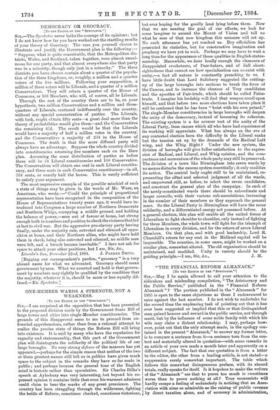DEMOCRACY OR GEOCRACY.
[To THE EDITOR OF THE " SPECTATOR." j SIR,—The Spectator never lacks the courage of its opinions; but I do not know how far you have worked out the startling results of your theory of Geocracy. The case you yourself choose to illustrate and justify the Government plan is the following :— " Suppose, what is quite conceivable, that the Metropolitan dis- tricts, Wales, and Scotland, taken together, were almost unani- mous for one party, and that almost everywhere else that party was in a minority, though only just in a minority." The three districts you have chosen contain about a quarter of the popula- tion of the three kingdoms, or, roughly, a million and a quarter voters of the five millions. Following your supposition, a million of these voters will be Liberals, and a quarter of a million Conservatives. They will return a quarter of the House of Commons, or 168 Members, who will, of course, all be Liberals.
Through the rest of the country there are to be, on your hypothesis, two million Conservatives and a million and three- quarters of Liberals, scattered indifferently over the country, without any special concentration of parties. The Liberals, with luck, might Obtain fifty seats—a great deal more than the theory of probabilities would give them—and the Conservatives the remaining 452. The result would be that the Liberals would have a majority of half a million votes in the country", and the Conservatives a majority of 234 in the House of Commons. The truth is that the more diffused party will always have an advantage. Suppose the whole country divided into constituencies returning five members each on the Hare plan. Assuming the same distribution of parties as before there will be 34 Liberal constituencies and 100 Conservative. The Conservatives will obtain one seat in each Liberal constitu- ency, and three seats in each Conservative constituency—in all, 334 seats, or exactly half the house. This is surely sufficient to satisfy your argument.
The most impressive example of the possible mischief of such a state of things may be given in the words of Mr. Ware, an American, who wrote :—" Could the principle of proportional representation have been recognised in the composition of the House of Representatives twenty years ago, it would have in- troduced into Congress a large number of Northern Democrats and Southern Whigs, occupying a middle ground, and holding the balance of power,—men out of favour at home, but strong enough both in numbers and position to check the violence thatled at last to civil war. But the aggressive pro-slavery party having finally, under the majority rule, outvoted and silenced all oppo- sition at home, and their Northern allies, who might have held them in check, being also outvoted and silenced, no middle men were left, and a breach became inevitable." I dare not ask for space to attack your other positions, but I am, Sir, &c., Lincoln's Inn, December 22nd, 1884. J. PARKER SMITH.
[Begging our correspondent's pardon, "geocracy " is a very absurd name for what we advocated. Geocracy should mean government by area. What we asserted and hold is that govern- ment by numbers may rightly be qualified by the condition that the majority, whatever it is, should be more or less equally dif- fused.—ED. Spectator.]


































 Previous page
Previous page